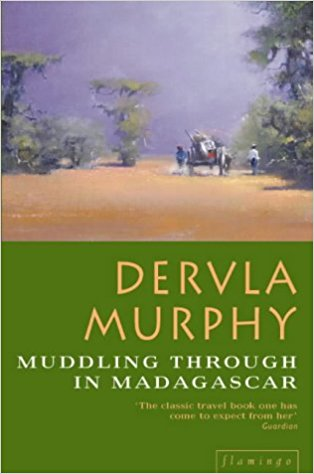 It’s hard to reconcile the Madagascar of Murphy’s 1985 travels with the tales of dispute verging on civil war that have been emerging from the country in mid-2002. The ravaging effects of the recent disputed election are at odds with the relaxed, apolitical country that Murphy presents. But 15 years is a long time, and if much of the country is still as undeveloped as Murphy describes, many people may have hardly noticed the politics of the capital.
It’s hard to reconcile the Madagascar of Murphy’s 1985 travels with the tales of dispute verging on civil war that have been emerging from the country in mid-2002. The ravaging effects of the recent disputed election are at odds with the relaxed, apolitical country that Murphy presents. But 15 years is a long time, and if much of the country is still as undeveloped as Murphy describes, many people may have hardly noticed the politics of the capital.
Murphy and her daughter start in the capital, Antananarivo (one of the simpler Malagasy names, which are generally long and complex), then after a trek in the central mountains they move to the south-east and south-west coasts. But her account starts with a long and dry historical account of the development of Madagascar. Although some historical context is important, 24 pages of it became tedious. It sets the tone for much of the rest of the book: heavy on description (of cities, landscapes, flora and fauna) but sometimes light on character. History comes up again and again, sometimes interrupting passages of entertaining narrative.
When Murphy adds some colour to her writing, the results are rewarding. The two road journeys in the south of the country are especially memorable, despite the discomfort endured by Murphy and her companions. The language barrier may have prevented much discussion between Murphy and the people she encounters, but the contributions of her daughter (who seems to have had a thoroughly miserable trip) and other travelling companions are limited to one-liners.
What comes through most strongly is the author’s view of the country. Nothing wrong with this: after all, it is her book. But her views on Madagascar’s development often turn to preaching. She leaves the reader in no doubt as to her views on what’s gone right and what’s gone wrong. Almost all western influence is portrayed negatively. Allied to this, she has a habit of comparing what she sees in Madagascar to her native Ireland. Although Ireland is not the wealthiest country in the world, it is probably more like the UK than it is like Madagascar.
However, it’s well worth persevering through the description and preaching. Madagascar is a fascinating country, and gets little exposure in the western press. Murphy loves it there, despite all the problems encountered during her travels, the warmth she feels for the people shines through. This is a travel book in the classic sense: description of a far off and strange place, avoiding both the introspection of Paul Theroux and the enforced jollity of Bill Bryson.
Overall verdict: Travel books on Madagascar are few and far between, but this is a fascinating country. If you can get used to Murphy’s writing style, it’s well worth a read.
Flamingo, 1998
